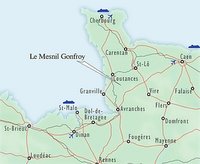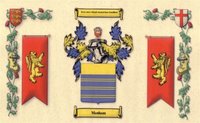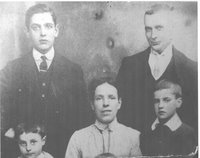Exploring the Roots of our Common Ancestry
 Why should we be so curious about our Family Ancestry?
Why should we be so curious about our Family Ancestry?In this fast moving age, family life has eroded somewhat and in many ways we may be in danger of not just losing our roots but also a clear sense of the importance of family history. Despite what some sceptics say 'blood' can still be 'thicker than water'. One generation may not be interested in talking about their family history and then all of a sudden the next generation is. Why should this be so?
Fortunately for me and any other member of my immediate or even not so immediate family, the name Menham is a little easier to trace back than many other more commonly known family names. Nevertheless family research requires persistance and much patience in order to uncover any hidden gems that may exist. It is also easier to conduct this research when all of the facts are at your fingertips and there are no gaps in your understanding. Fortunately with modern communications and especially the internet this task has been relatively easy.
Our Common Heritage
Research into genetics tells us that as a human race we all have a common ancestry and when language is considered for example the deeper you delve the closer the links can become. English shares a common ancestry with German and is influenced greatly by French. How can we pretend to be unique when our lives are so intimately interwoven with the lives of others whom we often view as foreigners. Family research however is a useful tool which allows us to set the details of our own immediate family into a broader or more global context.
We therefore start this exploration into the origins and history of the Menham Family in such a spirit of exploratuion and in such a context to make it of more general appeal.
Even though all of the details supplied have not yet been completely verified we hope that they will act as a spur for others to search out their own roots also. Surviving records are often scant and sometimes misleading but if we are lucky we may like archeologists find hidden or buried fragments that point us in the right direction.
One such fragment that I have uncovered for example is the oldest death record I have been able to find for a William Menham who died in March 1522 in Buckinghamshire. This made me wonder if there was a strong connection to our family name in this area and I was quite surprised to find an area of Buckinghamshire called Medmenham.
 The origins of this name however are said to be derived from the old English words Medume meaning 'middle' and ham meaning 'homestead' or 'enclosure'. However the name Medmenham has actually been derived it does not detract from the fact that it is a fascinating place steeped in history which was worthy of a mention in the Domesday Book, being amongst one of the oldest surviving villages in the country.
The origins of this name however are said to be derived from the old English words Medume meaning 'middle' and ham meaning 'homestead' or 'enclosure'. However the name Medmenham has actually been derived it does not detract from the fact that it is a fascinating place steeped in history which was worthy of a mention in the Domesday Book, being amongst one of the oldest surviving villages in the country.If you are curious to find out more about Medmenham's history follow this link supplied by Cathy Day of Canberra, Australia:-
http://users.rootsweb.com/~indwgw/harman/locations/medmenham.htm
Inspired by such an account I am now more determined than ever to find out if the Menham name has been recorded anywhere within the vicinity of this village and may go further back than the 1600's as we have been lead to believe. If we don't investigate will we ever find out?
According to some family researchers Menham was one of the many new names that came to England following the Norman Conquest of 1066 so there should be some records somewhere. For us this means that it was therefore also one of the oldest names that has survived into the 21st Century stretching back over a thousand years.
The Menham family in Yorkshire
I would welcome hearing from any Menhams whose family history is known to be rooted in the Yorkshire area and in time I will follow through on these possible connections.
The Menham family in Tyneside
My own immediate family springs from quite humble origins in the city of Newcastle-upon-Tyne and can trace its roots back to a Thomas Menham who was born in Newcastle in 1798. A short family tree follows the photo of my grandparents taken in Newcastle in 1908.

George Menham Born 10.8.1866 Died February 1919.
He married Elizabeth Ann Thompson on 20.1.1900.
Elizabeth Ann Thompson died on 19.3.1962.
She was born About 1879.
The father of Elizabeth Ann Thompson was a George Thompson.
The picture above is of George and Elizabeth in 1906
The father of George Menham was Henry Thomas Menham born about 1841 in Newcastle on Tyne.
He was christened on 16.2.1842.
His wife was IsabelIa Carr born about 1842 in Newcastle on Tyne. She was christened on 13.2.1843
She was married to Henry Thomas Menham on 21.10.1861.
The father of Henry Thomas Menham was Thomas Menham born in 1798.
He married Ann who was born about 1806. (We do not know Ann's maiden name).
The father of IsabelIa Carr was George Carr.
His wife was Mary (We do not know Mary's last name)
The father of Thomas Menham born about 1798 was Henry Menham. His mother was Jane (We do not know Jane's maiden name)
See also my cousin Alan's website in Australia for more details:
www.menham.com.au
The strongest links are in the North East of England today. Despite the fact that this is said to be an old English name, Menham, is also said to refer to the family's place of residence prior to the Norman Conquest in 1066, Mesnil, Normandy (pictured above) . The ancient chronicles of England and early records of the name Menham, appear to show it to be an old Norman surname...
"In-depth research by skilled analysts into ancient manuscripts such as the Domesday Book (compiled in 1086 by William the Conqueror), the Ragman Rolls, the Wace poem, the Honour Roll of the Battel Abbey, The Curia Regis, Pipe Rolls, the Falaise Roll, tax records, baptismals, family genealogies, local parish and church records, shows the first record of the name Menham was found in Yorkshire where they were seated from very early times and were granted lands by Duke William of Normandy, their liege Lord, for their distinguished assistance at the Battle of Hastings in 1066 A.D. Many alternate spellings were found in the archives researched, typically linked to a common root, usually one of the Norman nobles at the Battle of Hastings. Although the name, Menham, appeared in many references, from time to time the surname included Meynell, Meynill, Meynil, Menel, Mannell, Maynell, Maynall, and Mannell."Spellings have differed as also have people's literacy levels.
The following page 'Colonisers and Settlers' discusses how members of the Menham family may also have found their way to different parts of the new world. This we know did in fact happen as shipping records definitely exist which mark the passage of a number of people bearing the menham name. In more recent times Alan's father left Newcastle for a new life in Brisbane, Australia in October 1922 and my sister Ann, left Newcastle in the late 1970's to lead a new life in Canada and more recently in the USA. The Menham name also lives on there today. We would welcome contact from any Menhams currently living in the USA.
If you have any relevant comments please enter them below.







